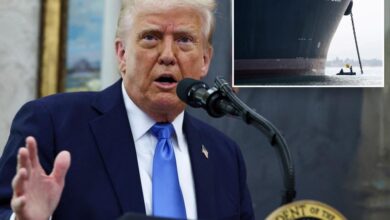Car Tariffs Are Coming. For Some Buyers, That Was a Reason to Act.

During a Saturday morning car shopping trip along Northern Boulevard in Queens, Ziggy Duchnowski had two main objectives in mind. He was on the lookout for a new small car for his wife and hoped to secure a deal before President Trump’s newly imposed tariffs on imported cars and trucks took effect.
Mr. Duchnowski, a union carpenter who supported Mr. Trump, expressed concern about the anticipated price hikes due to the 25 percent tariffs on vehicles and parts produced outside the United States. These tariffs, set to begin on April 3, are expected to impact the North American auto industry significantly by raising prices on new cars and trucks.
The impending tariffs will not only lead to increased prices on new vehicles but also compel automakers to reconfigure their North American manufacturing operations and seek cost-cutting measures to counter the tariffs’ effects. This has motivated some consumers to expedite their vehicle purchases before the price surge.
Industry analysts project significant price hikes on new vehicles, ranging from a few thousand dollars for entry-level models to over $10,000 for high-end cars and trucks. The spike in new vehicle prices is also expected to impact the prices of used cars.
The tariffs will have a broad reach, affecting every automaker in some way. Companies like General Motors, Toyota, Honda, and Volkswagen, which produce vehicles in Canada and Mexico, as well as Mexico-based Volkswagen, are among those that will feel the tariffs’ impact. The sales manager at Lynnes Hyundai in Bloomfield, N.J., anticipates that customers will start noticing the 25 percent price increases once the tariffs take effect.
At Hudson Toyota in Jersey City, N.J., customers like Alvaro Duarte are taking preemptive measures by trading in their gas-powered cars for electric models to avoid potential price hikes. The impending tariffs have created a sense of urgency among buyers, prompting them to act before the increased costs impact their finances.
The general manager at McGrath Subaru Evanston in Skokie, Ill., reported a surge in sales activity due to the tariffs, with customers rushing to make purchases before prices escalate. The impact of the tariffs is rippling through the auto industry, influencing consumer behavior and dealership operations.
In New York, Abdul Azeez, a salesman at Audi Manhattan, noted that customer traffic remained steady, attributing it to the affluent neighborhood’s consistent car-buying patterns. However, in Ann Arbor, Mich., a Tesla showroom attracted protesters voicing concerns over the company’s chief executive’s cost-cutting initiatives.
The demonstrations were part of a larger movement against Tesla’s business practices, reflecting public discontent with corporate decisions that impact employees and consumers. The protests underscored the broader societal implications of economic policies and corporate actions.
The protests at Tesla showrooms across the United States and globally highlighted the growing concerns over corporate accountability and ethical business practices. Customers and activists are mobilizing to hold companies like Tesla accountable for their actions and demand transparency and fairness in their operations.
The demonstrations reflect a broader societal shift towards increased scrutiny of corporate behavior and a call for more responsible business practices. As consumers become more aware of the impact of their purchasing decisions, companies are facing growing pressure to align with ethical and sustainable practices.





